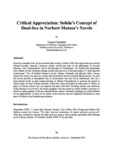Please use this identifier to cite or link to this item:
https://cris.library.msu.ac.zw//handle/11408/1518| Title: | Critical appreciation: Sofola’s Concept of dual-sex in Norbert Mutasa’s novels | Authors: | Charamba, Tyanai | Keywords: | Society, individualistic isolationism | Issue Date: | Sep-2013 | Series/Report no.: | The Journal of Pan African Studies;Vol.6, No.3; p. 53-73 | Abstract: | Drawing examples from the pre-colonial Igbo society, Sofola (1998) has argued that pre-colonial African societies enjoyed a dual-sex system which had roots in the philosophy of ‘holistic harmony’ and ‘communalism’ and in the principle of ‘relatedness’. For Sofola, that philosophy was violated by the European thought system that has roots in the philosophy of ‘individualistic isolationism’. Two of Norbert Mutasa’s novels: Nhume YaMambo and Misodzi Dikita Neropa expose the nature of a dual-sex system that prevailed in the pre-colonial Shona society. As such, the novels provide an atmosphere and an environment that can aid an intellectual, who has a keen interest in the up and coming theories of African Womanhood, to question the degree to which tenets of some of those theories, which have been developed in some parts of Africa, do apply to African cultures that are separate and apart from their founding cultures and traditions. Using Mutasa’s two novels, this article grapples with the extent to which Sofola’s concept of a dual-sex system applies to the pre-colonial Shona culture. Generally speaking, the article debates on the applicability of some of the tenets of the theories that are originally developed in some parts of Africa to the Zimbabwean situation. | URI: | http://www.jpanafrican.org/docs/vol6no4/6.4-ready4.pdf http://hdl.handle.net/11408/1518 |
| Appears in Collections: | Research Papers |
Files in This Item:
| File | Description | Size | Format | |
|---|---|---|---|---|
| sofola.pdf | Abstract | 480.72 kB | Adobe PDF |  View/Open |
Items in MSUIR are protected by copyright, with all rights reserved, unless otherwise indicated.



